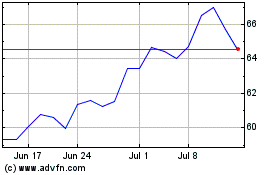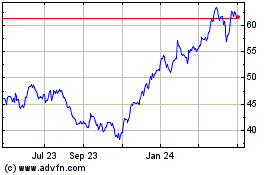UPDATE: SEC Seeks Greater Penalties In Fraud Cases
November 29 2011 - 1:31PM
Dow Jones News
WASHINGTON (Dow Jones)--The Securities and Exchange Commission
is asking lawmakers for authority to impose greater financial
penalties on individuals and Wall Street firms that commit fraud
following a federal judge's ruling questioning the adequacy of a
proposed $285 million SEC settlement with Citigroup Inc. (C)
In a letter to key senators late Monday, SEC Chairman Mary
Schapiro said the agency is constrained by statute from imposing
financial penalties that match investor losses. She also warned the
agency can't adequately take into account the seriousness of
misconduct nor its impact on victims.
Schapiro's letter asks Sens. Jack Reed (D., R.I.) and Mike Crapo
(R., Idaho), to increase the legal formulas by which the agency
calculates financial penalties. The senators hosted a hearing this
month on the issue of SEC structural reforms.
For civil cases such as the Citi matter, Schapiro is asking for
authority to seek penalties equal to three times the "pecuniary
gain," or a firm's net profits, from a fraudulent transaction. The
SEC is currently limited to seeking penalties equal to a firm's net
profits in such deals.
"That would allow the commission to address situations where the
actual pecuniary gain to the violator is relatively small compared
to the nature or magnitude of the wrongdoing," Schapiro wrote.
Another proposed statutory change would allow the agency to
calculate penalties based on the amount of investor losses incurred
as a result of the misconduct, for both civil cases and
administrative proceedings.
A third change, which would also be used in civil cases and
administrative proceedings, would allow the agency to impose
penalties of up to $1 million per violation for individuals and $10
million for financial firms. That would represent an increase from
current caps of $150,000 and $725,000, respectively.
A spokesman said Reed is working on legislation "to improve the
SEC's ability to obtain meaningful monetary sanctions for serious
securities fraud violations."
The legislation also would seek to improve the SEC's ability to
sanction companies and individuals with a pattern of repeated
violations of the federal securities laws, another focus of
Schapiro's letter. Schapiro said current law "does not provide the
commission with adequate tools to deter this category of
violators."
The letter came the same day as U.S. District Judge Jed S.
Rakoff rejected a $285 million deal by Citi to settle civil fraud
charges that it failed to disclose to investors its role in
selecting investments in a $1 billion mortgage-bond deal that it
was simultaneously betting would fail.
Rakoff ordered the matter to go to trial next summer, saying the
settlement was "neither fair, nor reasonable, nor adequate, nor in
the public interest."
-By Andrew Ackerman, Dow Jones Newswires; 202-569-8390;
andrew.ackerman@dowjones.com
Citigroup (NYSE:C)
Historical Stock Chart
From Apr 2024 to May 2024

Citigroup (NYSE:C)
Historical Stock Chart
From May 2023 to May 2024
